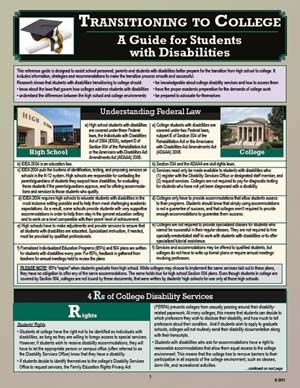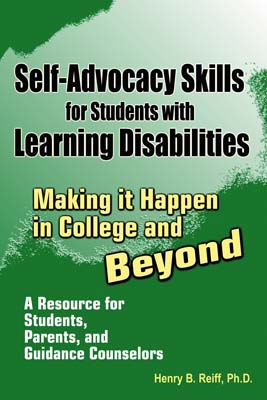It’s the time of year when high school seniors are beginning to hear back from colleges to which they’ve applied early decision or early admission. By mid-spring, students will learn general admission decisions. From that point, students will have a relatively short window for deciding upon which college to attend. With many students today applying to half a dozen to a dozen schools, making this decision can be quite difficult; there are always many factors to weigh. For all students the decision is a critically important one. However it is especially important for students with disabilities who have received special education services in elementary/middle/high school.
Students with disabilities can be very successful in college, but not without planning, preparation and support. Hopefully, by the time students with learning disabilities are at the point of making the about where to go to college, they will have already taken many steps to prepare for the transition from high school to college. Experts on making the transition from high school to college for students with disabilities, such as Elizabeth C. Hamblet, recommend students, their families, and their IEP teams start thinking of and planning for this transition at the beginning of high school.
The purpose of high school is to prepare students to succeed in college and beyond. Students with documented learning disabilities and other disabilities are usually eligible for accommodations, such as support services and academic adjustments. While intensive accommodations may be very helpful in high school, they could end up limiting the child’s choices of colleges later. For example, a student who has had foreign language or math requirements waived may not meet certain colleges’ admissions standards. Likewise, many schools will not admit students who have not taken common standardized tests like the SATs.
 Furthermore, the documentation required for applying for accommodations is not necessarily the same for college as for high school. It is essential for students and their families/counselors to know the requirements of disability documentation in general, and the requirements at specific schools. The quick-reference laminated guide, Transitioning to College: A Guide for Students with Disabilities, by Elizabeth Hamblet, outlines disability documentation requirements and offers guidance on how to make the high school to college transition successful for students with disabilities.
Furthermore, the documentation required for applying for accommodations is not necessarily the same for college as for high school. It is essential for students and their families/counselors to know the requirements of disability documentation in general, and the requirements at specific schools. The quick-reference laminated guide, Transitioning to College: A Guide for Students with Disabilities, by Elizabeth Hamblet, outlines disability documentation requirements and offers guidance on how to make the high school to college transition successful for students with disabilities.
It is also important to plan ahead for college by taking into account the skills students will need to succeed in college, and the support services various colleges offer. Colleges have a lot of latitude in determining what are “reasonable” accommodations. They are under no obligation to provide students with the same accommodations they received in high school under their IEP plans. The only legal obligation for colleges is that they provide students with disabilities access to the curriculum. It is therefore important that students thoroughly research both the admissions requirements and support services offered by individual schools well before they need to apply to college. That way the IEP team can create a plan that will ensure the students acquire the qualifications and skills they will need to get into the college they want to attend, and succeed once they are there. Researching the kinds of support services different schools offer will also help students and their families choose schools that provide the appropriate level of support.
 Students preparing to transition from high school to college need to know their legal rights and their responsibilities. Self-advocacy and self-determination are common characteristics of students with disabilities who are successful in college. Knowing where to find resources that will help them with self-advocacy, productivity, organization, study skills, and stress management is vitally important to successful self-advocacy. Fortunately, there are plenty of excellent resources out there designed to help students with disabilities successfully transition from high school to college, and do well once they are there. These include the laminated guide Transitioning to College: A Guide for Students with Disabilities by Elizabeth C. Hamblet and the book Self-Advocacy Skills for Students with Learning Disabilities by Henry Reiff, both published by NPR Inc./Dude Publishing, and available at www.NPRInc.com, along with dozens of other resources on this topic. Elizabeth Hamblet’s website, www.ldadvisory.com, is also an excellent resource for students with disabilities and their parents.
Students preparing to transition from high school to college need to know their legal rights and their responsibilities. Self-advocacy and self-determination are common characteristics of students with disabilities who are successful in college. Knowing where to find resources that will help them with self-advocacy, productivity, organization, study skills, and stress management is vitally important to successful self-advocacy. Fortunately, there are plenty of excellent resources out there designed to help students with disabilities successfully transition from high school to college, and do well once they are there. These include the laminated guide Transitioning to College: A Guide for Students with Disabilities by Elizabeth C. Hamblet and the book Self-Advocacy Skills for Students with Learning Disabilities by Henry Reiff, both published by NPR Inc./Dude Publishing, and available at www.NPRInc.com, along with dozens of other resources on this topic. Elizabeth Hamblet’s website, www.ldadvisory.com, is also an excellent resource for students with disabilities and their parents.








